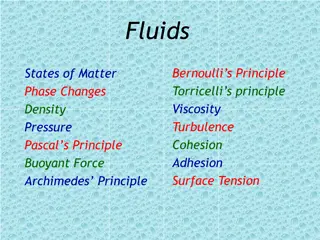Understanding Boat Floatation with Archimedes Principle
Explore the concept of why boats float using Archimedes' principle, which explains the relationship between density, volume, and buoyancy. Discover how objects sink or float based on their density relative to water, and experience a hands-on investigation to witness these principles in action.
Download Presentation

Please find below an Image/Link to download the presentation.
The content on the website is provided AS IS for your information and personal use only. It may not be sold, licensed, or shared on other websites without obtaining consent from the author. Download presentation by click this link. If you encounter any issues during the download, it is possible that the publisher has removed the file from their server.
E N D
Presentation Transcript
Investigate why boats float Using Archimedes principle to investigate why boats float
Stay safe Whether you are a scientist researching a new medicine or an engineer solving climate change, safety always comes first. An adult must always be around and supervising when doing this activity. You are responsible for: ensuring that any equipment used for this activity is in good working condition behaving sensibly and following any safety instructions so as not to hurt or injure yourself or others Please note that in the absence of any negligence or other breach of duty by us, this activity is carried out at your own risk. It is important to take extra care at the stages marked with this symbol:
Archimedes Archimedes was a mathematician and physicist in ancient Greece During a bath, he noticed that water spilled over the sides when he got in He then realised the relationship between volume and mass
What is Density? Density is the amount of mass something has per unit volume If two things are the same size, the one that is more dense is heavier The cubes are the same size High density Low density
Archimedes principle The Archimedes Principle is a scientific law. It explains why some objects sink and some objects float. Things that are denser than water will sink Things that are less dense than water will float (be buoyant)
Falkirk Wheel The Falkirk wheel lifts boats up 11 m, from one canal to another canal The Archimedes principle allows the wheel to work The control system was designed by Fairfield Control Systems
Step 1 Fill the jug with 600 ml of water Ball approx. 50 g Roll a 50 g piece of modelling clay into a ball Place the ball into the jug Does the ball float or sink?
Step 2 The level of the water will now have raised to about 650 ml Write down the displacement of the water Why has the ball sunk?
Step 3 Mould the modelling clay ball into a small boat shape Place the boat into the jug The displacement (height of the water when the modelling clay is added) is the same as the weight has not changed The density is less so the modelling clay floats!
Why do boats float? Large ships like cruise ships have wide U-shaped hulls These displace huge volumes of water, but are mainly hollow This decreases the effective density of the ship and helps keep it afloat, even when it is full with cargo and passengers
Extension Try adding small items into the modelling clay boat. How much weight it can carry before it sinks? Calculate the density of the ball and the boat shape made from modelling clay.























